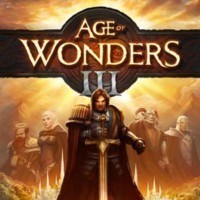Age of Wonders 3: General information
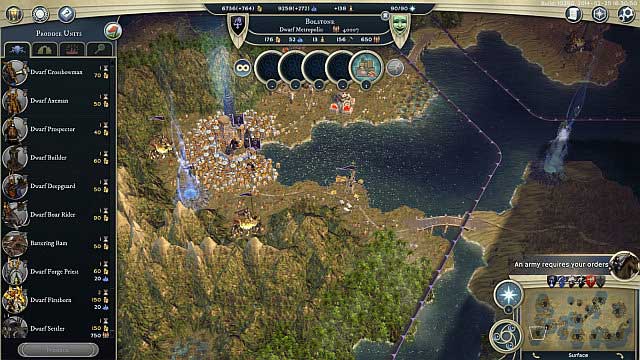
There are 6 races in the game and they differ from each other, mainly in terms of the available units, which they can manufacture. Each race has its upsides and downsides, as well as favored and disfavored terrain type (setting up a city on the favored terrain increases contentment) and race-dependent skills, which can be used by all units. race selection depends on the selection of the main leader - the first city and the units will be of the same race as the leader. Race selection does not exclude ownership of cities and unit of the other races however, it is necessary to capture a city inhabited by another race.
As it has been already mentioned, each race can manufacture different units. They differ, from each other, in terms of type (e.g. cavalry, archers), skills and statistics. There also are units that you can summon into the battlefield and fantastical units - beasts fairies and dragons. Additionally, you can recruit special units, different for each class. It is best to group several units into an army - of up to six units, including the leader. Single armies are easy to defeat and that is why they should be used, mainly, for ma exploration, so as the loss of these units is not too painful. Therefore, it is a good idea to use the cheaper ones, for this purpose, or the less expensive type of cavalry, which has more movement points than the other units.
Skills
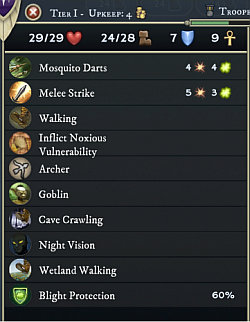
Various units have various skills, which are very important because, it is not only statistics, such as the number of health points, or attack strength that determine the combat value of a given unit. Often, it is skills that are more important than the basic attributes. To find out which unit has what skills, you need to click the miniature of that unit, with the left mouse button. This will open a list of all the skills available for that unit where, apart from the basic ones, such as attack and walking, you will learn about various defense bonuses and weaknesses. Therefore, it is worth knowing about the strong points of the enemy units and of the ones that you have.
Morale
An important element of each army is its morale, i.e. the factor of the general contentment and belligerence. The starting morale of the units is dependent on the contentment of the city, where they have been manufactured. Morale is influenced by the events in the game, e.g. a lost battle or lack of gold for maintenance. The low level may result in desertion and dealing damage lower than usually. The high factor, on the other hand, increases the chances of dealing critical damage, higher than usually.
Experience
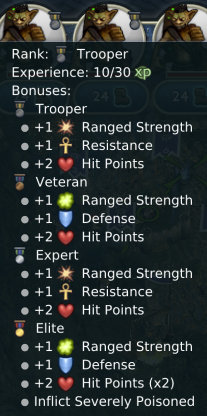
During the game, each unit gains experience. As it grows, the units rise in ranks, which affects, on the other hand, that unit's attributes. You gain experience, of course, by dealing damage and killing the enemy units, using skills or casting spells. The more experience you have, the higher the rank, which is symbolized by the small medal in the upper-right corner of the icon that represents the unit. At the last experience level, the unit additionally receives a skill, e.g. Inflict Severely Poisoned in the case of the Goblin Swarm Darter. The initial experience level can be raised by erecting special buildings in the cities. Heroes and leaders, along with the rising level, can distribute their upgrade points to gain new skills, spells or to improve on their attributes.
Damage type
Damage that the units deal has been divided into physical and non-physical. You can defend against physical damage with the Defense attribute. You receive such damage, mainly from melee attacks and archer fire. Non-physical damage can be decreased by means of resistance. Non-physical damage is dealt with attacks of the Fire, Frost, Blight, Shock and Spirit types. Therefore, it is worth knowing if a unit is more vulnerable to magical or to physical attack and, not waste archer fire on a unit with high value of defense, but rather move them over the battlefield, and attack a different unit, where they can deal more damage. The conclusion is, therefore, simple - it is better to have in your army, units that deal both types of damage, to avoid problems with defeating a unit that is highly resistant to given type of attack.
Assembling of the army
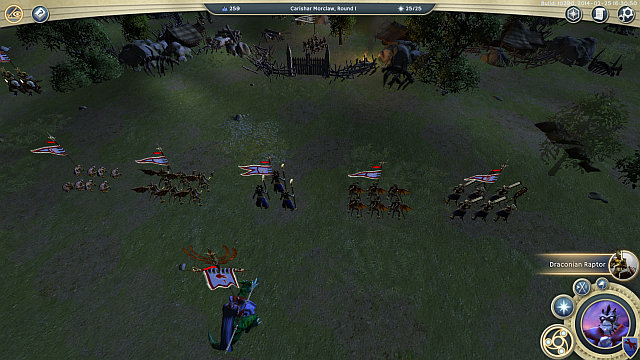
1. Make sure that your army is diversified. There is no point in leading, e.g. archers only into the battle. Various types of units have various bonuses against the other units, e.g. the Pikemen units against Cavalry. Aldo, types of attacks are different - some of the units are more resistant, e.g. to physical attacks, and more vulnerable to magical ones. A diverse army will ensure you with the possibility of choosing an appropriate attack a given type of unit, which results in dealing maximum damage.
2. Recruitment at the cities is not the only way to expand your army. Various units can be summoned (depending on the class that you chose), or recruit them in Dwellings. Especially the second option can be very useful - often, it is the expensive, but very good units that will win your battle.
3. Try not to lose your units in a silly way, during battles. The units that gain experience become stronger and stronger, when they receive the highest rank (Elite). The best way to gain experience is by attacking armies that are weaker than your own. Thanks to this, you can be nearly sure that you will win the battle, without sustaining losses.
4. Always try to have, in your army, at least one unit with the True Sight skill, thanks to which you will be able to see the hidden enemy units.
5. Remember about the siege engines, such as the Trebuchet or battering rams. They will help you bring down the gates quickly, during sieges. You should also realize that the abovementioned engines are vulnerable to physical damage (fire), which you should use to your advantage.
6. Not all of the units can be recruited from the very beginning. Most of them require building appropriate structures in the city, which is why, depending on the adopted tactic, try to strive for being able to recruit the best (and the most expensive) units, or flood the enemy with a numerous, cheap but weak in general, army.
7. Experiment with class selection. Description of the units is nothing, in comparison with how they do in battle and the subjective feel. You need to find out which class suits you best. Each race is good for a victorious game and you can play an enjoyable game with each of them.
You are not permitted to copy any image, text or info from this page. This site is not associated with and/or endorsed by the developers and the publishers. All logos and images are copyrighted by their respective owners.
Copyright © 2000 - 2026 Webedia Polska SA for gamepressure.com, unofficial game guides, walkthroughs, secrets, game tips, maps & strategies for top games.
